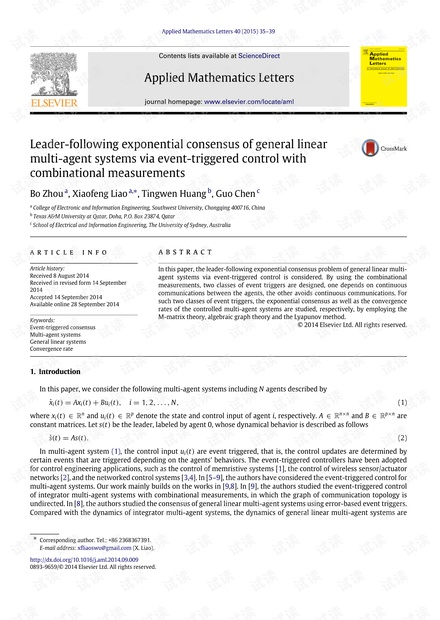
Applied Mathematics Letters 40 (2015) 35–39
Contents lists available at ScienceDirect
Applied Mathematics Letters
journal homepage: www.elsevier.com/locate/aml
Leader-following exponential consensus of general linear
multi-agent systems via event-triggered control with
combinational measurements
Bo Zhou
a
, Xiaofeng Liao
a,∗
, Tingwen Huang
b
, Guo Chen
c
a
College of Electronic and Information Engineering, Southwest University, Chongqing 400716, China
b
Texas A&M University at Qatar, Doha, P.O. Box 23874, Qatar
c
School of Electrical and Information Engineering, The University of Sydney, Australia
a r t i c l e i n f o
Article history:
Received 8 August 2014
Received in revised form 14 September
2014
Accepted 14 September 2014
Available online 28 September 2014
Keywords:
Event-triggered consensus
Multi-agent systems
General linear systems
Convergence rate
a b s t r a c t
In this paper, the leader-following exponential consensus problem of general linear multi-
agent systems via event-triggered control is considered. By using the combinational
measurements, two classes of event triggers are designed, one depends on continuous
communications between the agents, the other avoids continuous communications. For
such two classes of event triggers, the exponential consensus as well as the convergence
rates of the controlled multi-agent systems are studied, respectively, by employing the
M-matrix theory, algebraic graph theory and the Lyapunov method.
© 2014 Elsevier Ltd. All rights reserved.
1. Introduction
In this paper, we consider the following multi-agent systems including N agents described by
˙
x
i
(t) = Ax
i
(t) + Bu
i
(t), i = 1, 2, . . . , N, (1)
where x
i
(t) ∈ R
n
and u
i
(t) ∈ R
p
denote the state and control input of agent i, respectively. A ∈ R
n×n
and B ∈ R
p×n
are
constant matrices. Let s(t) be the leader, labeled by agent 0, whose dynamical behavior is described as follows
˙
s(t) = As(t). (2)
In multi-agent system (1), the control input u
i
(t) are event triggered, that is, the control updates are determined by
certain events that are triggered depending on the agents’ behaviors. The event-triggered controllers have been adopted
for control engineering applications, such as the control of memristive systems [1], the control of wireless sensor/actuator
networks [2], and the networked control systems [3,4]. In [5–9], the authors have considered the event-triggered control for
multi-agent systems. Our work mainly builds on the works in [9,8]. In [9], the authors studied the event-triggered control
of integrator multi-agent systems with combinational measurements, in which the graph of communication topology is
undirected. In [8], the authors studied the consensus of general linear multi-agent systems using error-based event triggers.
Compared with the dynamics of integrator multi-agent systems, the dynamics of general linear multi-agent systems are
∗
Corresponding author. Tel.: +86 2368367391.
E-mail address: xfliaoswu@gmail.com (X. Liao).
http://dx.doi.org/10.1016/j.aml.2014.09.009
0893-9659/© 2014 Elsevier Ltd. All rights reserved.
















